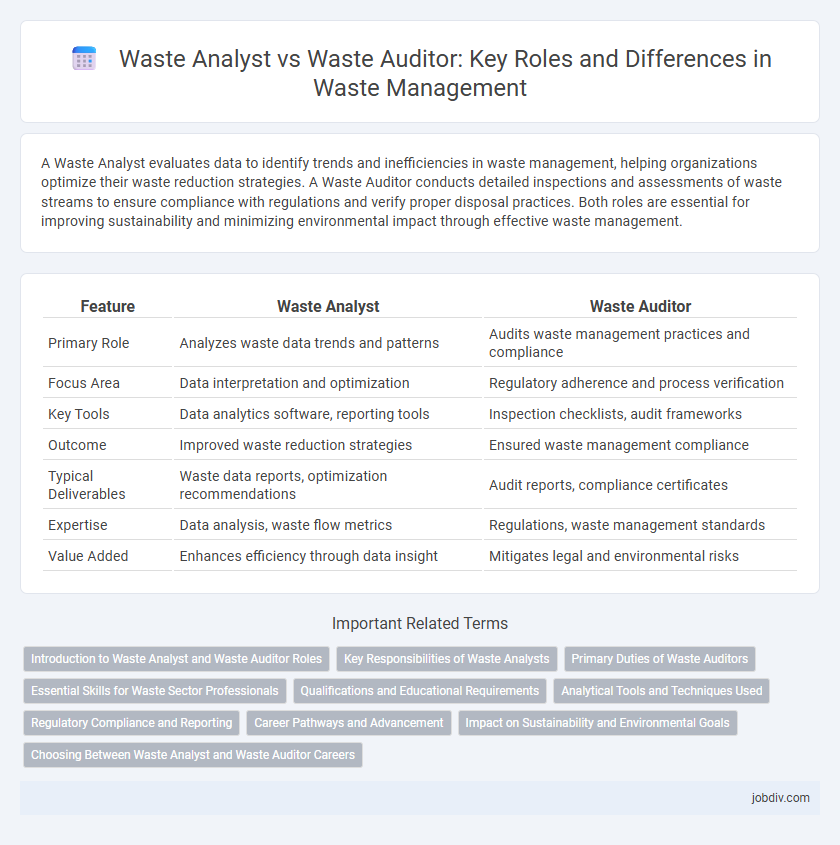A Waste Analyst evaluates data to identify trends and inefficiencies in waste management, helping organizations optimize their waste reduction strategies. A Waste Auditor conducts detailed inspections and assessments of waste streams to ensure compliance with regulations and verify proper disposal practices. Both roles are essential for improving sustainability and minimizing environmental impact through effective waste management.
Table of Comparison
| Feature | Waste Analyst | Waste Auditor |
|---|---|---|
| Primary Role | Analyzes waste data trends and patterns | Audits waste management practices and compliance |
| Focus Area | Data interpretation and optimization | Regulatory adherence and process verification |
| Key Tools | Data analytics software, reporting tools | Inspection checklists, audit frameworks |
| Outcome | Improved waste reduction strategies | Ensured waste management compliance |
| Typical Deliverables | Waste data reports, optimization recommendations | Audit reports, compliance certificates |
| Expertise | Data analysis, waste flow metrics | Regulations, waste management standards |
| Value Added | Enhances efficiency through data insight | Mitigates legal and environmental risks |
Introduction to Waste Analyst and Waste Auditor Roles
Waste Analysts evaluate waste management processes by collecting and interpreting data to improve efficiency and reduce environmental impact. Waste Auditors systematically inspect waste streams to identify compliance issues, quantify waste types, and recommend corrective actions. Both roles are essential for optimizing waste reduction strategies and ensuring regulatory adherence in waste management systems.
Key Responsibilities of Waste Analysts
Waste Analysts focus on collecting, analyzing, and interpreting data related to waste generation, composition, and disposal methods to identify patterns and opportunities for waste reduction. They develop detailed reports and forecasts to support strategic decision-making in waste management and sustainability initiatives. Their role involves collaborating with departments to implement waste minimization strategies and monitor progress towards regulatory compliance and organizational goals.
Primary Duties of Waste Auditors
Waste auditors primarily conduct comprehensive assessments of waste streams to identify reduction opportunities, ensure regulatory compliance, and improve overall waste management efficiency. They collect and analyze data on waste types, quantities, and disposal methods, generating detailed reports to guide sustainable practices. Their work supports organizations in minimizing environmental impact and optimizing resource recovery through targeted audit findings.
Essential Skills for Waste Sector Professionals
Waste analysts excel in data management, statistical analysis, and environmental regulations to optimize waste reduction strategies. Waste auditors specialize in conducting on-site waste assessments, compliance inspections, and identifying inefficiencies in waste handling processes. Both roles require strong knowledge of sustainability practices, regulatory frameworks like EPA guidelines, and proficiency in waste tracking software to enhance sector performance.
Qualifications and Educational Requirements
A Waste Analyst typically requires a bachelor's degree in environmental science, engineering, or a related field, with skills in data analysis, waste management regulations, and sustainability reporting. A Waste Auditor often needs formal training or certification in auditing, environmental compliance, or waste diversion programs, alongside practical experience in conducting waste assessments and identifying efficiency improvements. Both roles benefit from knowledge of environmental policies, waste reduction technologies, and proficiency in relevant software tools for data collection and reporting.
Analytical Tools and Techniques Used
Waste Analysts utilize data management software and statistical analysis tools like Excel, SQL, and Python to assess waste generation patterns, forecast trends, and optimize waste reduction strategies. Waste Auditors apply measurement techniques such as waste composition analysis, material flow studies, and on-site inspections, often supported by tools like barcode scanners, waste tracking software, and environmental compliance checklists. Both roles rely on Geographic Information Systems (GIS) and Life Cycle Assessment (LCA) software to enhance accuracy and support sustainable waste management decisions.
Regulatory Compliance and Reporting
A Waste Analyst specializes in evaluating waste streams to ensure regulatory compliance through detailed data analysis and tracking reporting metrics aligned with environmental laws. A Waste Auditor conducts comprehensive inspections and verifications of waste management processes, verifying adherence to regulations and identifying discrepancies in disposal and recycling practices. Both roles contribute to accurate regulatory reporting but differ in focus: Analysts interpret data trends, while Auditors validate operational compliance on-site.
Career Pathways and Advancement
A Waste Analyst primarily focuses on data collection, trend analysis, and waste stream optimization, using software tools to identify inefficiencies. Waste Auditors conduct on-site inspections to verify waste management compliance, assess disposal practices, and ensure regulatory adherence. Career advancement for Waste Analysts often leads to roles in environmental consulting or sustainability management, while Waste Auditors may progress to regulatory compliance management or environmental auditing supervision.
Impact on Sustainability and Environmental Goals
A Waste Analyst evaluates data on waste generation and disposal patterns to identify opportunities for reducing landfill contributions and improving recycling rates, thereby directly supporting sustainability metrics. A Waste Auditor conducts on-site inspections to verify waste handling compliance and assess the accuracy of waste reporting, ensuring organizations meet environmental regulations and sustainability commitments. Both roles are crucial for advancing environmental goals by promoting efficient waste management and minimizing ecological footprints.
Choosing Between Waste Analyst and Waste Auditor Careers
Waste Analysts specialize in evaluating waste management data to optimize resource use and reduce environmental impact, utilizing analytical tools and sustainability metrics. Waste Auditors focus on inspecting waste streams, identifying compliance issues, and ensuring regulatory adherence through detailed audits and site assessments. Selecting between these careers depends on one's preference for data-driven strategy development versus hands-on inspection and regulatory enforcement within waste management.
Waste Analyst vs Waste Auditor Infographic

 jobdiv.com
jobdiv.com